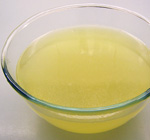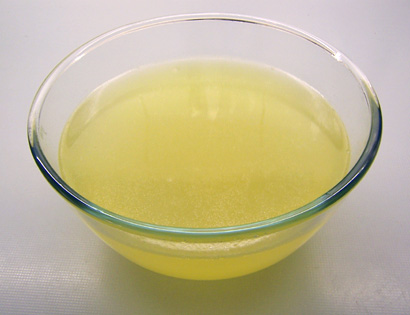Fish Stock
Fish Stock
to your Favourites...

This makes a clear and fragrant stock, useful for fish soups and sauces.
Ingredients
- 500g fish frames (bones without heads)
- 260g onion (2)
- 380g leek (2)
- 130g celery (2 sticks)
- 2 peeled cloves of garlic
- 2 bay leaves
- 1 small bunch of dill
- 1 small bunch of taragon
- 1 sprig of thyme
- 1 teaspoon of peppercorns
- 5 litres of cold water
Preparation Time: 15 minutes
Cooking Time: 1 hour 30 minutes
Serves: of stock
Method
- Rinse the fish bones under cold, running water for about 10 minutes to remove any blood.
- Peel the onion, and chop it into quarters.
- Remove the root and the green of the leek and chop it with the celery into 5cm pieces.

- Put fish bones into a large pot with the water and bring it to the boil.
- When it starts to boil, turn it down to a low heat and remove the scum that floats to the surface. Then add all the other ingredients.

- Simmer gently for 1½ hours.
- Using a fine sieve, strain the liquid into a bowl. There will be a natural sediment from the bones that will have settled on the bottom of the pot. Make sure not to pour this through the sieve.
- Discard all the bones, vegetables, herbs and the sediment in the pot.
- Allow the stock to cool naturally and use as required.

Useful Information
Can it be frozen? Yes.
Can it be prepared in advance? Yes, it can be finished up to 2 days in advance.
Will leftovers be nice? Yes, for up to 2 days.
Notes
- The reason for skimming the scum off the surface off the liquid is to help prevent the stock going cloudy. It is easier to do this before the vegetables go in, otherwise they get in the way.
- When simmering the stock, make sure the heat is very low, there should be hardly any bubbles breaking the surface. Boiling the stock will result in it becoming bitter and cloudy.
- The best fish bones to use for stock are from flat fish such as turbot, halibot and sole. This is because they have a large surface area that contains a good amount of natural gelatine which sets the stock.
Sponsored Links

